#forefathers eve
Text
II część Dziadów – Adam Mickiewicz
vs
Pan Tadeusz – Adam Mickiewicz
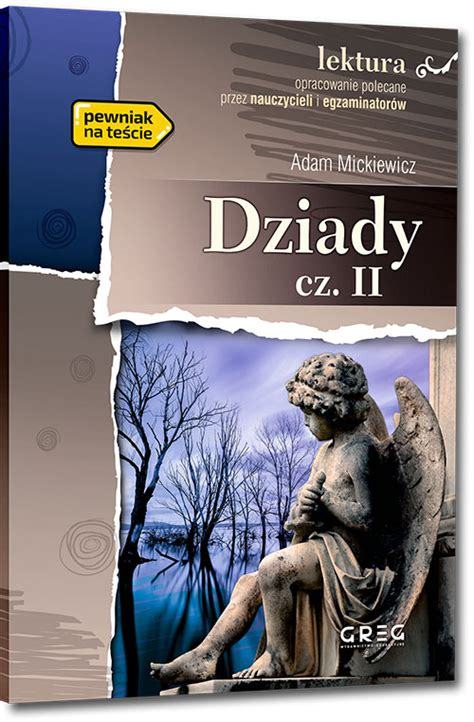
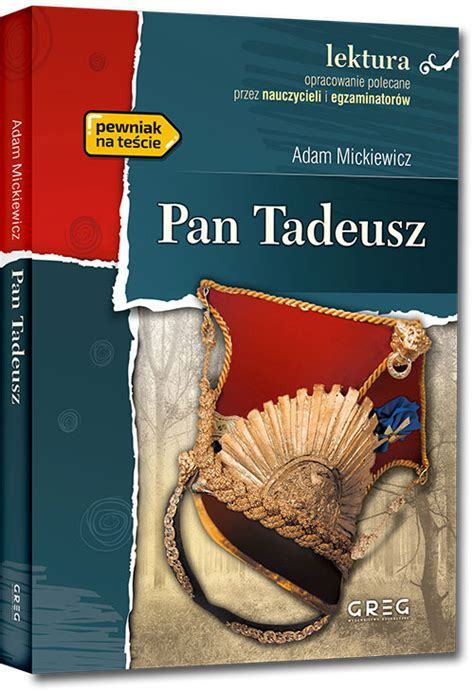
#lektury#lektury szkolne#literature#polish literature#polish posting#polbr#literatura polska#polish#poland#polska#szkoła#liceum#brackets#polls#tournament#bitwa lektur szkolnych#ankieta#dziady#dziady cz 2#forefathers eve#pan tadeusz#pojedynek mickiewiczów
14 notes
·
View notes
Text
Happy Forefathers’ Eve everyone!
0 notes
Text
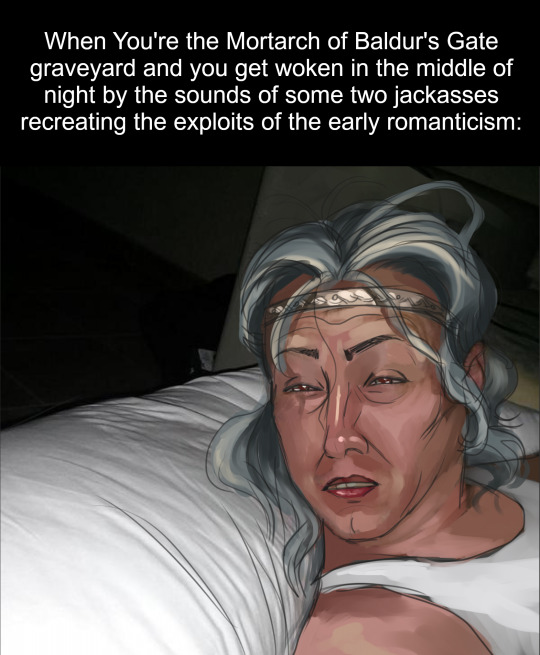
'Not these Kelemvor-damned undead again' - murmured Gracie Scyra and rolled over.
#BG3#Astarion#BG3 meme#tablet crimes#Tav really got Mary Shelley'd#(I know I know it's just a rumour but it's a funny one)#also don't @ me the whole scene is romanticism incarnate#To the one OP who noticed that Astarion exactly replicates the Gustaw/Konrad move from the Forefathers' Eve pt. 3#(albeit with reversed symbolism)#I can't find your post anymore but You're hilariously right and Your brain is huge
41 notes
·
View notes
Text
Dziady

Yes, this was drawn and, supposed to be posted on the forefathers' eve, but i completely forgot, and now it's december -_-"
Alicja's clothes aren't any from any specific region, just loosely based on a couple of different ones
#my art#phantasmagoria#oc: alicja#character illustration#dziady#forefathers' eve#slavic art#slavic folklore#polishposting#polish folklore#polish folk costume#strój ludowy#slavic paganism#landscape painting#pagan art#oc art
30 notes
·
View notes
Text
My Western, mostly American and Anglo-Saxon friends: Halloween
My Celtic friends: Samhain
Me, a Slav: DZIADY
But seriously, I really recommend you to read about Dziady (or the Forefathers’ Eve, as that’s how it is sometimes translated into English). It is traditionally celebrated in Belarus, Ukraine, Baltic countries, and some parts of Poland as well. Similarly to Celtic Samhain, it is also believed that during Dziady our ancestors come back to the world of the living. As the descendants, we are obligated to welcome them properly, commemorate them, and learn from whatever advice they may have for us. It's really cool, Adam Mickiewicz, the national poet of Poland, Lithuania and Belarus, even wrote a drama inspired by this feast!
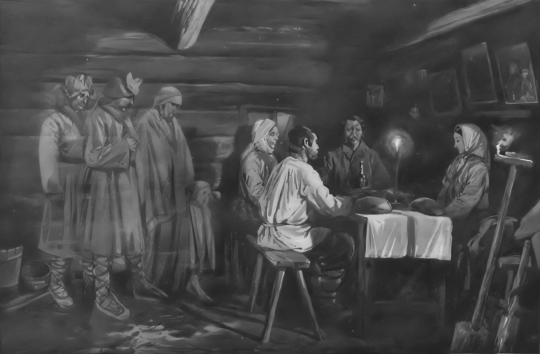
(“Dziady, pradziady, przyjdzcie do nas!” Depiction of dziady ritual in Belarus, Stanisław Bagieński. Source: Wikipedia)
More under this link:
#eastern Europe#eastern european#slavic countries#baltic countries#poland#belarus#ukraine#lithuania#latvia#estonia#halloween#samhain#dziady#the forefathers’ eve#slavic culture#dziady jesienne#ancestral cult#october 31st#november 1st
179 notes
·
View notes
Text


Starzec idzie na Oppenheimera, a Karusia i lud na Barbie
#adam mickiewicz#romantyczność#dziady#forefather's eve#polish tumblr#polish literature#polska literatura#polskie lektury#poezja#polish dark academia#oppenheimer#robert oppenheimer#barbieheimer#romantyzm
50 notes
·
View notes
Text
I DON'T CARE ABOUT HALLOWEEN GIVE ME DZIADY
#dziady#bede rbic dziady impreze#na pocztaku mielismy zr halolinowa ale jednak slav pride#FOREFATHERS' EVE!!!!!!!!
3 notes
·
View notes
Text
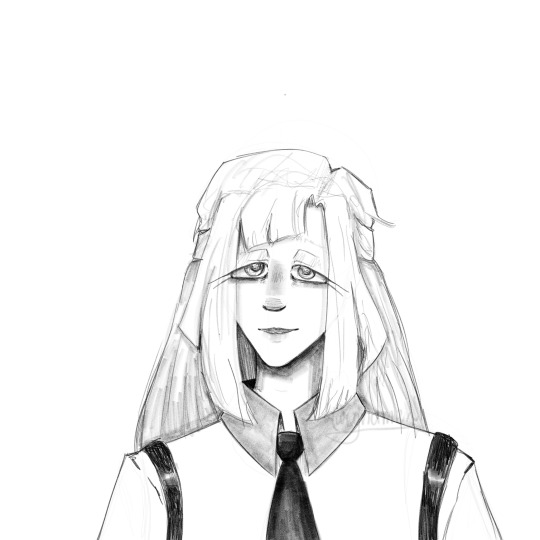
Anastazja, one of my faves atm :)c
some concepts bc i dont have anything w her on digital




#oc#original character#portrait#digital#Anastazja oc#whofe#What Happened On Forefathers Eve#<- oc lore name#still haven't decided on how i'll portray it#thinking about making it a visual nover OR video that pretends to be a visual novel playthrought OR a comic#idk yet#doodle#concept art#cynameru posting
4 notes
·
View notes
Text
i ffukin love how much folklore there is in the witcher universe
#also i love how only one term into uni and i have a new perspective on the game and lore#the field in white orchard where you fight the griffin has lot of small dips and hills. SIGN OF GENERATIONS OF AGRICULTURE#im not really familiar with older polish/slavic cultural heritage so i didnt realise forefathers eve was based on a real tradition#the thought to look it up only struck me now#falling in love again#felicia liveblogs into the void
0 notes
Photo


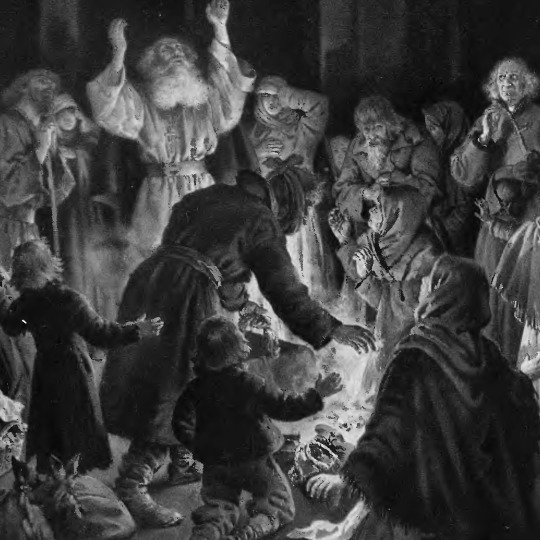
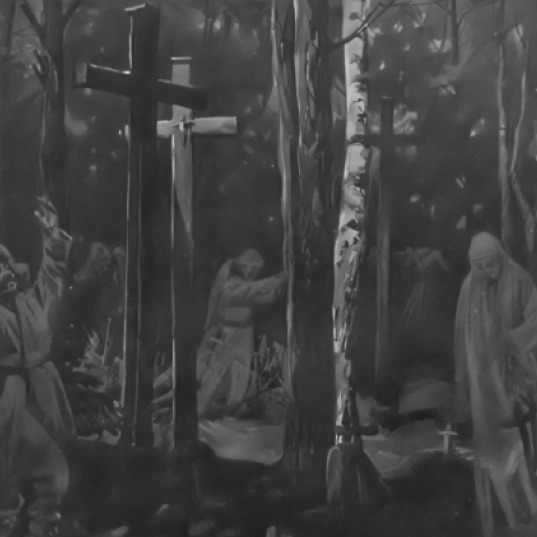
DZIADY
(literally "grandfathers, eldfathers" // sometimes translated as Forefathers' Eve)
• Belarusian — Dzyady
• Russian — Dedy
• Ukrainian — Didy
• Polish — Dziady
👻 A term in Slavic folklore for the spirits of the ancestors and a collection of pre-Christian rites, rituals and customs that were dedicated to them. The essence of these rituals was the "communion of the living with the dead", namely, the establishment of relationships with the souls of the ancestors, periodically returning to their headquarters from the times of their lives. The aim of the ritual activities was to win the favor of the deceased, who were considered to be caretakers in the sphere of fertility. The name "dziady" was used in particular dialects mainly in Poland, Belarus, Polesie, Russia and Ukraine (sometimes also in border areas, e.g. Podlachia, Smoleńsk Oblast, Aukštaitija), but under different other names (pomynky, przewody, radonitsa, zaduszki) there were very similar ritual practices, common among Slavs and Balts, and also in many European and even non-European cultures.
👻 Within the framework of grandfather's rituals, the souls coming to "this world" had to be hosted in order to secure their favour and at the same time help them to achieve peace in the hereafter. The basic ritual form was feeding and watering of souls (e.g. honey, groats, eggs, forge and vodka) during special feasts prepared in houses or cemeteries (directly on graves). A characteristic feature of these feasts was that the people who ate them dropped or poured some of their food and drinks on the table, floor or grave for the souls of the deceased. In some areas, however, the ancestors also had to be given the opportunity to bathe (a sauna was prepared for this) and warm up.This last condition was fulfilled by lighting fires, whose function is sometimes explained differently. They were supposed to light the way for wandering souls so that they would not get lost and could spend the night with their loved ones.
👻 In the Slavic tradition, depending on the region, the feast of the deceased was celebrated at least twice a year. The main dziady were the so-called spring dziady and autumn dziady:
• Spring dziady were celebrated around 1 and 2 May (depending on lunar phase).
• Autumn dziady were celebrated on the night from October 31 to November 1, also known as All Souls' Day, which was a preparation for the autumn day of the dead, celebrated around November 2.(depending on lunar phase).
👻 To this day, in some regions of eastern Poland, Belarus, Ukraine and part of Russia, it is cultivated to carry on the graves of the dead a symbolic meal in clay pots. The majority of Slavic neo-pagan and rodnover movements also cultivate the dziady.
👻 Christianity, on the one hand, fought against pagan rituals, successively banning them, and on the other hand, it tried to adapt some of them in an attempt to christianize them. In the case of the dziady, both the Catholic and the Orthodox Church tried to marginalize and then eliminate pagan festivals by introducing into their squares (at the same or similar moments of the annual cycle) Christian festivals and practices). In Poland it's All Saint's Day at November 1, which is celebrated by most Polish people instead of dziady.
#some ppl were interested in *slavic halloweeen*#Dziady#Halloween#slavic culture#slavic#slavs#pagan#slavic folklore#polish folklore#russian folklore#ukrainian folklore#poland#russia#belarus#ukraine#posted by me#🔮
159 notes
·
View notes
Text
How many people have accepted the idea that Lent is the time when something which may be good in itself is forbidden, as if Good were taking pleasure in torturing us. For the authors of lenten hymns, however, Lent is exactly the opposite; it is a return to the "normal" life, to that "fasting" which Adam and Eve broke, thus introducing suffering and death into the world. Lent is greeted, therefore, as a spiritual spring, as a time of joy and light:
The Lenten spring has come,
The light of repentance. . .
Let us receive the announcement of Lent with joy!
For if our forefather Adam had kept the fast,
We would not have been deprived of paradise. . .
The time of Lent is a time of gladness!
With radiant purity and pure love,
Filled with resplendent prayer and all good deeds.
Let us sing with joy. . .
--Rev Dr. Alexander Schmemann: Great Lent - Journey to Pascha
8 notes
·
View notes
Note
Hi! I hope you're well! I recently came across the term guślarz in the context of Slavic pre-christian practices and I was wondering if you know of any information/sources that discuss them? Thank you!
Honestly I do not know any sources that discuss guślarze specifically but I can convey to you what little I am aware of regarding the use of this word.
So firstly, guślarz is a Polish word. Similar words no doubt exist in other Slavic languages but I am only focusing on the role of this term in Polish language because that’s what I know.
The word guślarz is derived from gusła meaning magical rituals of some sort. Guślarz is a man who practices magic, performs rituals, a folk healer, a sorcerer. His feminine counterpart is guślarka (historically this one was used much less often but still can be found). The word gusła took the meaning of „magical rituals” and „fortune telling” in XVth century - so pretty late. My sources on this are two Polish philologists, linguists and slavists Franciszek Sławski (as relayed to us by Krzysztof Bilica and PWN dictionary of Polish language) and Andrzej Bańkowski (as relayed to us by Monika Grotek). Word guślarz is first found in Polish language in XVIIth century, evolving from earlier words gusłarz and guślnik dating back to XVIth and XVth century.
I will try my best to translate what Monika Grotek has to say on the subject of guślarz in her article Etymologia polskich nazw postaci ludzkich rodzaju żeńskiego i męskiego parających się magią (Etymology of Polish names for people, male and female, who practice magic):
However, the authors of etymological dictionaries argue about the origin and original meaning of the word gusła. Bańkowski conservatively recognizes the difficulty in unambiguously determining the etymology of, in his opinion, the Polish relic word †guslo, which was probably in the form †gud-slo and meant 'ways to ward off evil powers', and derived from the verb gud-i-ti, which in Old Russian meant as much as 'to blame, to condemn' and is related to the synonymous common Slavic †gad-i-ti 'to make disgusting, to disgust' (hence, e.g. the word gad) and the later †gyd-i-ti derived from it, 'to repulse' (hence hydzić and ohyda). Thus, a sorcerer is likely a man dealing with protection against disgusting and socially condemned evil powers, expelling hideous demons or counteracting charms.
On the other hand, Wiesław Boryś notes that the word gusła may come from *gud-slo or *gǫd-slo (plural *gudsla or *gǫdsla), in which we can find the name of an activity with the suffix *- slo originating from the Proto-Slavic *gǫsti, *gǫdǫ 'to play a stringed instrument' (hence e.g. the instrument gusle), or from the variant †gusti, †gudǫ (with the old alternation *u/*ǫ), which is also indicated by the Bulgarian gùsla/gъsla, meaning 'stringed instrument, gusle'. Therefore, the original meaning of the word guslo is 'playing a stringed instrument', 'playing gusle' - and music, with its ability to induce a state of trance could be used in magical ceremonies performed by a sorcerer who, thanks to music and through music, was able to make contact with the supernatural world like a shaman in the native cultures of the peoples of Africa or America.
Here you have two sound theories on the role and conception of guślarz.
The modern associations of the word guślarz in Polish language originate from much later times - the Romanticism and Dziady (eng. Forefathers Eve) a XIXth century poetic drama written by Adam Mickiewicz. The drama describes in it’s second part a folk ritual known as dziady, typically a feast commemorating the ancestors. In the drama however guślarz accompanied by a crowd of villagers summons ghosts of people who for some reason cannot enter heaven and tries to help them access it.
Funnily enough originally the character conducting the ceremony was a priest. Mickiewicz changed it to guślarz at a later stage of his work. The later version also includes a line about how the priest forbade people from conducting the ritual. It is speculated that the character of guślarz was added specifically to include more magical and folkloric motifs that Romanticism was all about.
This is where we get the dominant view of guślarz as a man who works with the souls of the dead, this is also quite literally where we get guślarz as seen in The Witcher 3 (Pellar), since quests connected to him are heavily inspired by the drama Dziady and some of his incantations draw directly from its text.
In modern Polish the words gusła and guślarz are slightly archaic and have a pejorative undertone, with gusła being used as something synonymous with „superstitions”.
When it comes to pre-Christian Slavic traditions you might have more luck researching words such as zhrets (pl. żerca) or volkhv (pl. wołchw) which I believe are a bit better explored than guślarz.
Best of luck!
Zarya
26 notes
·
View notes
Text
The more I work on my hazbin ocs the more i realize the show prolly could work better if an actual human was in the cast. Not to steal Charlie's spotlight obviously but like a modern adaptation of Dante's inferno. It would be funny if the hotel starts hosting tours. And it connects to the sinner v. winner conflict, as a human who isn't dead is made to choose which side to be on.
I also read some analysis on adam that explains his behavior. And the more i think about it, it paints his relationship to the Smiths in a whole new light. They're Cains' descendants. How can he look upon them knowing their forefather is the first murderer, his son, and one of his literal granddaughters is making sketchy choices. But it's also due to circumstances that are genuinely out of her control. She can't help Cain is her granddad, or her father's killer was never brought to justice, or America is that shitty. Sometimes you just DON'T have a choice. And well, SHE'S A CHILD. CHILDREN DON'T KNOW ANY BETTER AND WORSE IT BE THE ADULTS GROOMING THEM TO DO BAD.
Not to mention sin committed to save lives, like someone fighting back and even having kill in order to save themselves or their families. Or someone forced to steal food to survive. Killing and stealing are sin but it's not that simple when you have to do it to survive.
Basically... Adam learns he is so out of touch with humanity he thinks it's the same black & white deal with heaven and hell but it's not. That's why my Eve left so she could remind herself she was human and nit fall into that same trap of arrogance as her husband.
8 notes
·
View notes
Note
Correct me if i'm wrong, and i might be (drunk) But aren't ghosts canon in the witcher universe? (or atleast some form of them) and since vampires hang out in isolated/abandoned areas wouldn't they probably have seen them a bunch of times and thus believe in them? Sorry if i am mistaken, just curious.
ghosts are definitely present in tw3 with multiple quests involving them (most famously, probably forefather’s eve and towerful of mice) but there were less ghosts in the books as far as i can remember—monsters tend to be more of ecological nature than of supernatural ones, or not given clear explanations as to their origin.
in the books… spirits exist, ciri spoke to vysogota within the tower at the end of tower of the swallow, and even some “presences” are seen and felt at the end by the boat, including milva, cahir, angoulême, coral, coën, paulie and regan dahlberg, and caleb stratton, but i can’t remember anyone ever summoning or meeting a ghost (asides from vysogota, who appeared under special circumstances and location)? a banshee is also mentioned in tower of the swallow, but it’s also not specified whether banshees in this universe are indeed ghosts or spirits or something else (like how vampires are regarded by most as “undead,” but that’s actually misinformation)
also about the idea itself: i do believe ghosts exist in-universe, but just think it would be funny if regis, being a vampire, did not believe in ghosts… he attributes it all to just hoaxes put on by creatures such as himself, and superstitious humans seeing their fears and regrets embodied by the darkness. the rest of the hanza thinks this ironic, but he does not see the contradiction, insisting that vampires and ghosts are very different things, he’s real, ghosts aren’t. but ghosts are real, he just doesn’t think they are—leaving an open narrative for him to be corrected. also, because this character often runs opposite to milva’s, and i know for a fact that milva’s superstitious ass believes in ghosts
#alternative idea: regis does believe in ghosts but because he has beef with them and zombies#ask#shrimpwizard
11 notes
·
View notes
Text
Girls' morning routine
Arts by @forefathers-eve
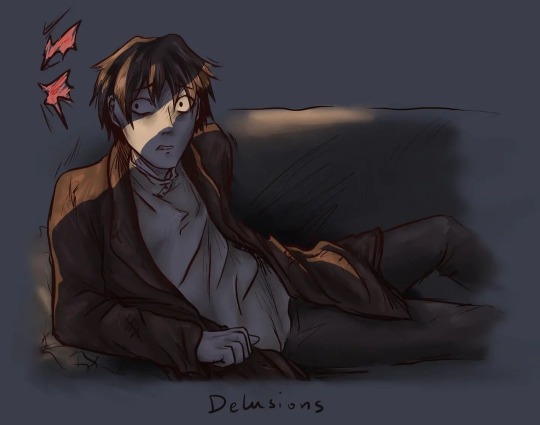
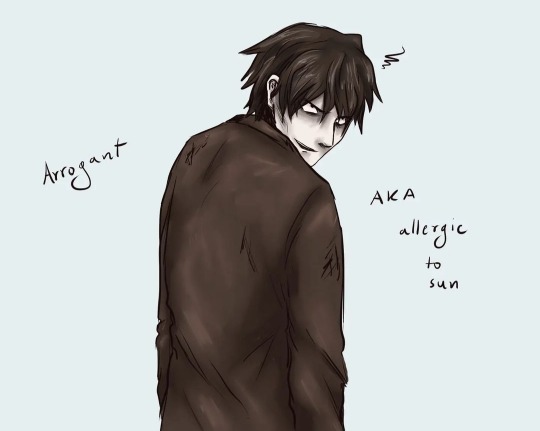
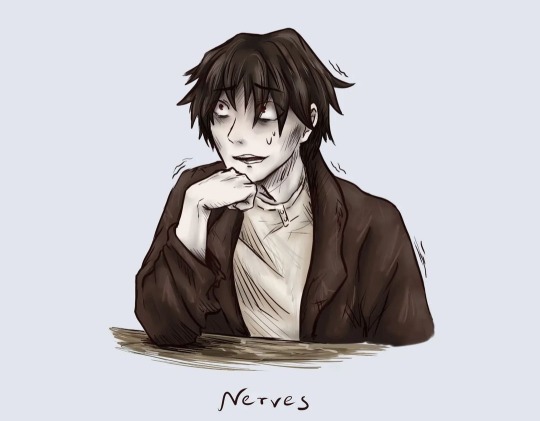
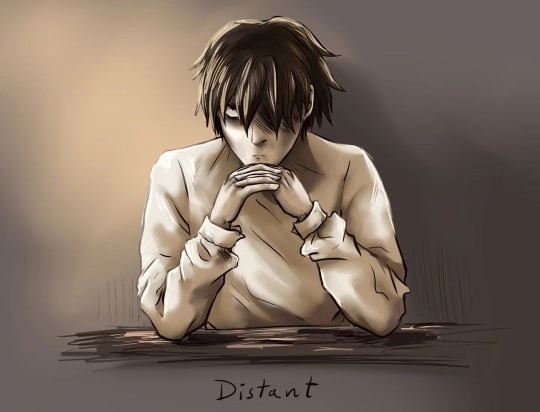
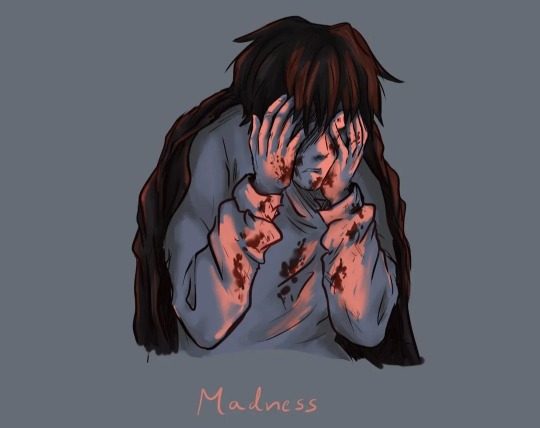
#morning routine#crime and punishment#dostoevsky#fyodor dostoevsky#russian literature#classic literature#russian lit memes#raskolnikov#rodion romanovich raskolnikov
57 notes
·
View notes
Note
OMG WHY 10 BUSINESS DAYS I DID NOTHING WRONG 😭 why must I pay the price of my forefathers' wrong doings 😔
Just like how we paid the price for Adam and eve's disobedience 😔 fr
9 notes
·
View notes